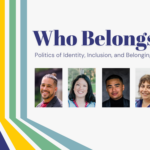
Thriving Staff of Color: Imagining Higher Education Institutional Transformation
September 20, 2024
Who Belongs? Politics of Identity, Inclusion, and Belonging
October 16, 2024Submit a pitch: “Freedom and Exploration Across Music Genres”
For this upcoming Spark Magazine series, we invite scholars to provide informed analysis on musical genres and offer guidance for readers to become critical music consumers. We anticipate publishing by January, before the 2025 Grammy Awards.
Most recently, Beyonce’s Cowboy Carter album challenges us as music listeners to be open-minded and critical when listening to music. Critical analysis of this album has led to public discourse on what defines country music as a genre. There are conversations about the genre's origin and whether country music was a Black art form historically. Discussions which followed the release of this album have sparked a conversation about our current social and political climates. Does the response to such a celebrated and decorated pop star crossing into a genre that white artists have dominated ignite some of the same emotions that are fueling dialogues about race, gender, and who belongs in American culture?
While Cowboy Carter offers country songs, Beyonce also presents songs in several other genres. One of the highlights of this album is Beyonce’s decision not to label this album as country. She encourages us to remove the labels of genres and just experience the music for what it is.
This leaves us to consider the cost of genres and how music labels may hinder the broader access to this art form. There is a current momentum towards change in the music industry to understand the history of music and acknowledge the innovation of women musicians and musicians of color across genres.
We invite scholars from various disciplinary backgrounds who can offer insights to inform and inspire the next generation of musicians and invite our readers to be critical music consumers. Potential essays may consider the following prompts but are not limited to:
- Provide a critical analysis of the work of artists who have challenged musical genres and changed the music industry.
- Present the histories of how musical genres have evolved and the reception from the audience.
- Examine how social-political climate(s) have influenced the music being created and consumed across genres.
- Analyze acknowledgments and accolades received (or not) by music artists who have challenged the status quo by pushing the boundaries of genres. This may include public discourse, album sales, or peer recognition.
- Offer framework(s) for identifying and understanding music and cultural appropriation vs reclaiming. This may include historical analysis and existing debates.
Readership
Please remember that Spark's audience is not specific to any discipline or education level. Envision the reader as someone who is interested in evidence-based information about the topic but without particular knowledge of your field. Authors must have previously produced scholarship or creative work related to the topic to ground the proposed essay.
Selection Process & Writing Guidelines
Scholars are invited to submit a pitch by Tuesday, October 15. Invited contributors will draft an essay (800–1,200 words) and be assigned a reviewer. We anticipate publishing by January, before the Grammy Awards.
Pitches will be reviewed based on public accessibility, grounding in diversity scholarship, and clear writing organization and style. Invited contributors must review the writing guidelines to submit a first draft within four weeks of being accepted and will be assigned a reviewer.
LaShawnda Fields, an assistant professor in the School of Social Work at the University of Arkansas, Fayetteville, will curate this series.
If you have any questions about the pitch submission process, please contact Spark managing editor Laura Sanchez-Parkinson at [email protected].
Spark Magazine is managed by the National Center for Institutional Diversity at the University of Michigan and offers timely and scholarly-informed essays on historical and current social issues. The editorial team centers a social justice approach to the review and publication process.
If you have any questions about the pitch submission process, please contact managing editor Laura Sanchez-Parkinson at [email protected].
